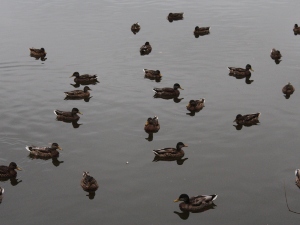
Humans aren’t the only animals that can experience stress, ducks, believe it or not, can also become stressed.
Ducks however don’t become stressed because of the same reasons that humans become stressed, and what a stressed duck looks like isn’t the same as what a stressed human looks like.
This article explores how to tell if a duck is stressed.
Table of Contents
How to tell that a duck is stressed:
Ducks can become stressed over a number of things, unlike humans, ducks don’t become stressed over deadlines or other people, heat, a lack of food, and change in lighting can be the reason why your bird is stressed
Here are signs that your bird is stressed:
Ruffled feathers:
Ducks usually have a smooth layer of feathers that cover their bodies, feathers that lay smoothly on the bird’s body are an indication of good health in the bird
However, if the bird’s feathers start to look ruffled then this can mean that the bird is stressed and cannot preen itself and maintain its feathers.
Reduced egg production:
Ducks lay eggs when their environmental conditions are good, that is, if they have access to enough food and water, if they have safe housing, and, if their environment is favorable.
If the birds are lacking in food, or feel unsafe, then they will come under stress because of the lack of resources or because of their lack of safety, and, they can stop laying as a result.
Loss of appetite:
Stress in ducks and humans can result in a loss of appetite.
If your bird has previously loved eating and suddenly developed a loss of appetite then the bird is likely stressed
Depression:
This is another sign that your bird is stressed, a stark change in your bird’s behavior, like a sudden depression, can mean that your bird is stressed.
A bird may become uninterested in doing the activities that it used to love and even start to isolate itself from other birds if it is stressed.
Heavy panting:
Heavy panting can mean that the bird is suffering from heat stress. Other signs of a duck suffering from heat stress include keeping its eyes closed, lifting its wings away from its body, laying down with its eyes closed, and being in distress overall.
Sitting down:
A duck that is sitting down isn’t necessarily something that you should worry about but it can sometimes be a sign that the bird is stressed.
If the bird is stressed it may suddenly sit down and collapse and lay there for a little while. A bird that becomes lame should be concerning to you.
What to do:
If you find that your bird is stressed then you’d need to do your best to find out why your bird is feeling stressed and remedy this. This is important because stress can kill a duck if not addressed.
If the bird becomes stressed because it is lacking food then you’d have to take a second look at how much food you’re giving the bird and likely serve more food.
You may also need to give your flock of birds more food dispensers so more ducks can feed at once, or, supply different types of food if the birds aren’t responding to the foods given.
If the birds are stressed because there is a predator in the area then you have to get rid of the predator. Duck predators may not only be wild animals like coyotes and bobcats, they can be your domestic cat or dog too.
If this is the case, then you’d need to keep your domestic animals out of the ducks’ view and ear sight to help the birds feel safe.
If your bird is stressed because of heat exhaustion, then you’d need to get the bird into a shaded area.
Also, supply cool water for the bird to drink and swim in as well as supply refrigerated treats to the bird like chilled watermelon, cucumber, strawberries, and grapes
If you try to relieve the bird of its stress, but the bird is not responding, then the bird may actually be ill and not stressed.
It is recommended that you take the bird to a vet, or better yet an avian vet, if you suspect that the bird is ill.
If you enjoyed this article then you may also be interested in other duck related articles. Here are some articles that you may be interested in: Why Did My Duck Die?, Why Do Ducks Keep Coming To My House, Duck Imprinting On Dog, Duck Imprinting On Humans, Do Ducks Know If Their Eggs Are Fertile?, How To Get Ducks To Lay Eggs In Winter

